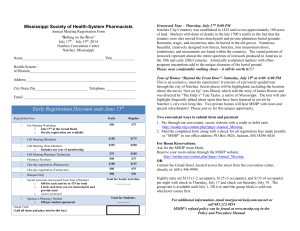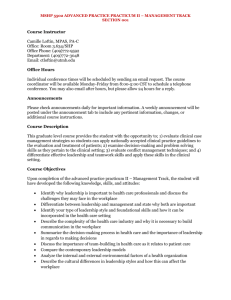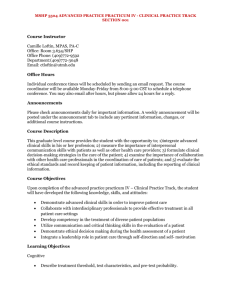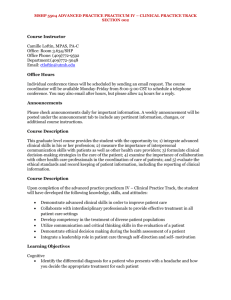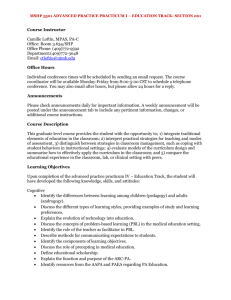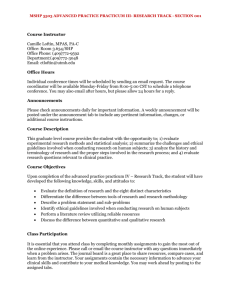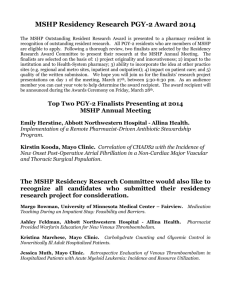Filming and Photography Guidelines
advertisement
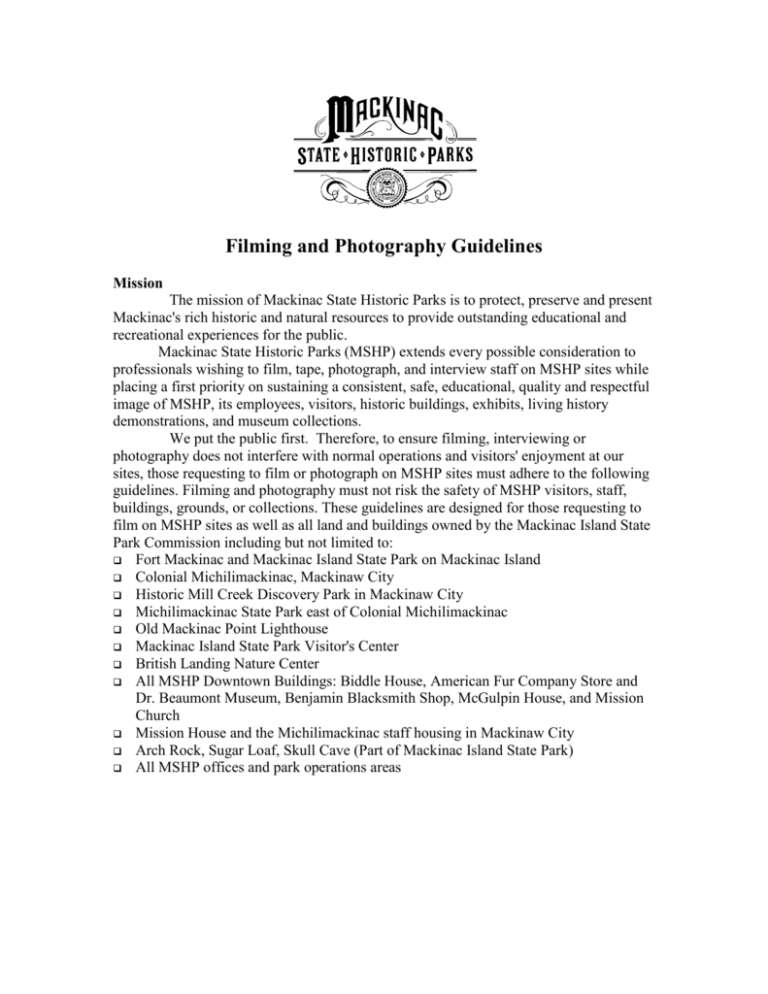
Filming and Photography Guidelines Mission The mission of Mackinac State Historic Parks is to protect, preserve and present Mackinac's rich historic and natural resources to provide outstanding educational and recreational experiences for the public. Mackinac State Historic Parks (MSHP) extends every possible consideration to professionals wishing to film, tape, photograph, and interview staff on MSHP sites while placing a first priority on sustaining a consistent, safe, educational, quality and respectful image of MSHP, its employees, visitors, historic buildings, exhibits, living history demonstrations, and museum collections. We put the public first. Therefore, to ensure filming, interviewing or photography does not interfere with normal operations and visitors' enjoyment at our sites, those requesting to film or photograph on MSHP sites must adhere to the following guidelines. Filming and photography must not risk the safety of MSHP visitors, staff, buildings, grounds, or collections. These guidelines are designed for those requesting to film on MSHP sites as well as all land and buildings owned by the Mackinac Island State Park Commission including but not limited to: Fort Mackinac and Mackinac Island State Park on Mackinac Island Colonial Michilimackinac, Mackinaw City Historic Mill Creek Discovery Park in Mackinaw City Michilimackinac State Park east of Colonial Michilimackinac Old Mackinac Point Lighthouse Mackinac Island State Park Visitor's Center British Landing Nature Center All MSHP Downtown Buildings: Biddle House, American Fur Company Store and Dr. Beaumont Museum, Benjamin Blacksmith Shop, McGulpin House, and Mission Church Mission House and the Michilimackinac staff housing in Mackinaw City Arch Rock, Sugar Loaf, Skull Cave (Part of Mackinac Island State Park) All MSHP offices and park operations areas Advance Arrangement Arrangements for filming, taping, recording, interviewing or photographing at MSHP must be made several days in advance through the Marketing and Development Unit. Contact: Public Relations and Marketing Officer Kelsey Schnell: 231-436-4100 (October-April), PO BOX 873, Mackinaw City, MI; 906-847-3328 (May-September), Box 370, Mackinac Island, MI 49757. Background Once you visit, we know you will agree with our request to respect Mackinac State Historic Parks as you would any of America's historic and natural treasures. MSHP contain Michigan's oldest buildings, artifacts, and hundreds of acres of unspoiled forests. These guidelines were developed to respond to increasing requests from film, photo, or commercial organizations who simply want to use MSHP as an attractive and "low cost" authentic historic backdrop without featuring MSHP sites or mission in return. Just as producers pay top dollar to film in large studios or pay high use fees to film in authentic settings, MSHP should be properly preserved, protected, respected and compensated as well for use of its unique sites, staff and resources. Members of the Media Travel writers, photojournalists, reporters, etc. are welcome at MSHP free of charge if they are producing a news or feature story about MSHP and they agree to send a finished product to the Public Relations and Marketing Officer. We welcome the opportunity to spread MSHP's mission to broad audiences around the world through all forms of media. We have worked with national networks from BBC to NBC, national cable, major U.S. and international daily newspapers, popular mainstream magazines, syndicated papers, public radio, and much more. If the Public Relations and Marketing Officer finds that a pre-scheduled media visit becomes more involved than a brief, reporter/photographer news or feature story, then these guidelines will be enforced and must be adhered to. One example of such a project is a commercial "documentary" that will eventually be sold for profit. Project Description/Script Prior to granting permission to use the property, MSHP requires an advance written description of the proposed project. This requirement can be waved by the Public Relations and Marketing Officer. MSHP reserves the right to require and review a script by MSHP historians and curators to ensure accuracy. Page 2 Commercial Use Commercial use of MSHP is discouraged. However, if a project is permitted, applicable staff and use fees will apply to properly compensate MSHP for time, staff, resources, etc. The fees will be higher than cost/break-even due to lost work and staffing hours. MSHP is a non-profit organization. The Public Relations and Marketing Officer can wave this requirement and any fees. Creation of stock photography of MSHP is not permitted. Season MSHP's sites are open from mid-May through mid-October. Scouting and/or filming on site before or after this time is discouraged due to limited staff and nonwinterized buildings. Off-season requests will be reviewed individually and must be made at least a week in advance. Weather can be cold in the Straits of Mackinac. Dress and prepare accordingly. Hours If the Public Relations and Marketing Officer determines that a requested project would interfere with normal operations and visitors' enjoyment of the sites, than filming must take place during daylight hours while the site is closed to the public. Necessary staff overtime and operations fees apply. Hours vary by site throughout the season. Actors and costumes Any outside talent including paid or volunteer actors, re-enactors, local residents, or requesting company employees must be pre-approved and insured. Costumes and props must be reviewed and approved by Museum Programs staff at least two weeks in advance of project to ensure that they are historically accurate. Historic Musket, Rifle and Cannon firings Only MSHP employees who have gone through MSHP's weapons black powder safety training are permitted to fire historic muskets, rifles or cannons, or run the sawmill for demonstration purposes only. Equipment Use of extra lighting, microphones, camera accessories, extension cords, need for electricity, etc. must be requested in advance. Any piece of equipment not listed here must be cleared and pre-approved. Electrical power and access to it in historic buildings is limited. Use of MSHP materials, equipment and staff is limited. Mackinac Island is a car and satellite-truck free island! Motor vehicles were banned in 1898. While on site The Public Relations and Marketing Officer or another designated MSHP representative must accompany individuals requesting to film or interview at all times while on site when, filming, interviewing, or when photography is taking place. The Public Relations and Marketing Officer is in charge of all filming projects and is the MSHP "point person" for all directors, photographers, videographers, producers, etc. All actors, re-enactors, crew, MSHP staff, etc. involved in a non-MSHP filming project will consult with Public Relations and Marketing Officer with questions or concerns. The Public Relations and Marketing Officer or designated MSHP representative has the right to discontinue filming, photography or interview if it is deemed the project is not adhering to MSHP's mission, or if the individuals requesting to film have not followed the guidelines listed here. Additionally, if the Public Relations and Marketing Officer witnesses MSHP visitors, staff, site, or collections are placed at risk in any way, the project will cease. Large entourages are discouraged. Filming with large crews, actors, equipment and entourages must be done while sites are closed, if approved. Credit MSHP requires the following acknowledgement unless a different credit format is approved in writing. ___________________________ acknowledges the assistance of Mackinac State Historic Parks, Mackinac Island and Mackinaw City, Michigan. Copies We require at least 2 complimentary copies of the completed film, slides, photographs, book, article, audio or videotape for our archives. Certificate of Insurance MSHP requires a Certificate of Insurance from those wishing to film, tape, or photograph at MSHP. The insurance certificate is evidence of proper insurance and adequate limits of coverage. MSHP must be named as an additional insured with respect to the work being done at MSHP. Coverage requirement will be determined on a project by project basis by the MSHP Director Page 4


